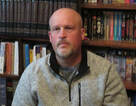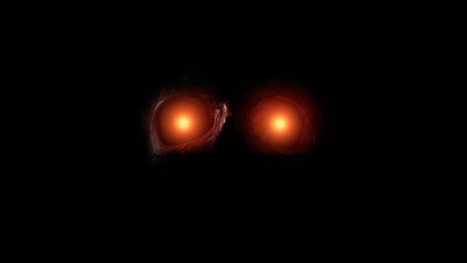|
Frank’s end began with a black spot where no black spot should have been. And Frank knew, though he pretended not to, that it meant Big Trouble. Frank had always been different, the bad sort of different. He was awkward and angry with things nobody was ever angry with. After the death of his wife, he drifted further, life’s tether stretching thin and strained. At the office, everyone supposed he was grieving, and gave him consideration. But over time, Frank became the odd character. First pitied, then scorned. He was an uncaring victim of sidelong looks and water-cooler jokes. Today had been stressful for Frank, as all of them were anymore. But now he was almost home. The city bus had only one more stop, and Frank’s turmoil was receding. Sighing, he turned and looked out the window, allowing himself the luxury of letting his mind go blank, taking in the view without really seeing the children playing in the park. The bus lurched to a start, and he tiredly turned to face the front. Suddenly he jerked back towards the park, confused and searching. There! Far back in the trees behind the bandstand was an alien, inky shadow. A dark black circle where no shadow should have been in the gentle twilight. He blinked, and it was gone. “What was that?” he whispered, mouth dry like a piece of black velvet. Or, a sly voice suggested, a portal. It happened again two days later. Idle at his desk, staring out at highway traffic, his heart suddenly skittered with fear. This time the vivid black spot was a tire on a delivery truck. When Frank blinked, it was gone and the tires were normal. Even as he told himself he was seeing things, he had noticed the black spot was bigger than before. After the fourth time (something is opening), Frank told himself it must be a problem with his vision. Surely not important enough for a doctor. At the pharmacy, he bought eye drops. He told himself, “It’s nothing serious.” But then the thing changed, and he knew it was worse than an eye problem. The Big Change happened when the spot began shifting into an emerging man-shape. After this, Frank became nervous and twitchy. He avoided looking out windows and would conform his body awkwardly to do so. When he walked, he stared at the ground. When he spoke, his darting eyes never lingering. He whispered to himself. His co-workers noticed. The old rumors of his wife’s death began again. “Frank has never been the same since his wife died.” “Never did get all the facts, did we?” The boldest went further, “They called it a suicide, but it sure was strange, wasn’t it?” And the thing kept coming. Growing. What was it, was it a man? No, it was too thick, too broad. Frank got a closer look one afternoon at home when he let his willpower lapse. Standing at the sink, washing dishes, he lifted his head and looked out the kitchen window. Immediately, as if it had been waiting for him, the shape strode out behind a nearby house. Frank froze, soapy dishrag in hand, unable to move or think. Before it disappeared behind the next house, Frank saw a large, beasty creature, reddish-brown, hairy and menacing. The worst thing? At the last moment, it turned its shaggy buffalo head and looked straight into Frank’s window. Frank squeezed his eyes shut and stood trembling, heart pounding with tremendous runaway force. He tried to unsee the thing and remember it at the same time. He now knew the thing was coming for him. It knew who he was. He thought of the old poem by Yeats. The slouching rough beast. After that, Frank’s world shrunk into a tightly wound sphere of fear and denial. Am I going insane, or is it real? It can’t be real. If it’s real, then everything is real—all the impossible things are true: vampires and monsters and all the fairy tales and God and Hell. And if that’s true, all the things we call normal are phony and flimsy. Or is this what it means to go mad? To wrestle inside a shadow world while pretending not to, and people just live their lives around you as if nothing is happening? On his last day, Frank loaded the old revolver and carried it in his pocket everywhere he went. At bedtime, he placed it on the night table. He didn’t sleep; he didn’t toss or turn. He just laid there, lamp on, holding his breath—listening . Just make it to sunrise. Make it to another day. When he heard the first footstep—it could have been anything—there hung a split second where it wasn’t real yet. But then another step, and another. Frank grabbed the revolver and lay with wide eyes, staring at the closed bedroom door. The steps came on, louder, overly forceful, taunting. Then, Frank heard heavy breathing, and it was at his door and was close enough he could smell it. Rank, fetid, inhuman. Impossibly, the doorknob began to turn, and though Frank wanted to close his eyes, he was paralyzed with terror. The door swung open, and a great, shaggy head peered around the doorway. It opened its mouth in a grotesque smile, huge yellow teeth slimed and dripping. Frank’s last thought was this: It isn’t real! If I speak to it, it will disappear. He shuddered, opened his dry mouth, and with a forced croak said, “I’m sorry.” *** The next day, little was done at the office. Each new piece of the story caused groups to gather in cubicles, the lunch room, or the water cooler. “Went the same way as his wife.” “Everyone could see Frank was having problems.” “Police said it was suicide. Doesn’t surprise me.” “And with the same gun his wife used.”  Mr. Thomas once studied journalism at Eastern Illinois University and now after more than 20 years in the manufacturing industry, is chasing his American dream of becoming a full-time novelist. His published works are listed on his website rf-thomas.com. With lifelong roots in the Midwest, he currently calls Central Illinois home. one late autumn the bitter water spread through the entire building filling mouths with a caustic taint but the tenants did not care enough to protest, until the dreams came: DREAD EVIL DARKNESS SADNESS EMPTY SO EMPTY a thousand agonies of loneliness the sum total grief of mere being the cats howling, the dogs whimpering a hundred people—men, women, children-- feeling that they were falling, falling, falling... forever and forever and forever, until-- after two nights of mass distress the grim hysteria bubbled over and—making a connection-- they finally sent the super up to the water tank he lifted the lid and there she greeted him: floating face down, fully clothed her backpack still about her thin shoulders her stygian hair clumped like rotting seaweed some of them had been wondering where she had got to she had been such a nice girl a little quiet perhaps. Harris Coverley has verse published or forthcoming in Polu Texni, California Quarterly, Star*Line, Spectral Realms, Corvus Review, Spank the Carp, Better Than Starbucks, View From Atlantis, Poets' Espresso Review, Once Upon A Crocodile, The Rye Whiskey Review, 5-7-5 Haiku Journal, and many others. He lives in Manchester, England. Follow Harris on Twitter @ha_coverley.
|
Archives
June 2024
Categories
All
|


 RSS Feed
RSS Feed